#God Takes Up Enoch
Text

The Book of the Generations of Adam
1 This is the book of the generations of Adam. In the day that God created man, he made him in God’s likeness. 2 He created them male and female, and blessed them. On the day they were created, he named them Adam. 3 Adam lived one hundred thirty years, and became the father of a son in his own likeness, after his image, and named him Seth. 4 The days of Adam after he became the father of Seth were eight hundred years, and he became the father of other sons and daughters. 5 All the days that Adam lived were nine hundred thirty years, then he died.
6 Seth lived one hundred five years, then became the father of Enosh. 7 Seth lived after he became the father of Enosh eight hundred seven years, and became the father of other sons and daughters. 8 All of the days of Seth were nine hundred twelve years, then he died.
9 Enosh lived ninety years, and became the father of Kenan. 10 Enosh lived after he became the father of Kenan eight hundred fifteen years, and became the father of other sons and daughters. 11 All of the days of Enosh were nine hundred five years, then he died.
12 Kenan lived seventy years, then became the father of Mahalalel. 13 Kenan lived after he became the father of Mahalalel eight hundred forty years, and became the father of other sons and daughters 14 and all of the days of Kenan were nine hundred ten years, then he died.
15 Mahalalel lived sixty-five years, then became the father of Jared. 16 Mahalalel lived after he became the father of Jared eight hundred thirty years, and became the father of other sons and daughters. 17 All of the days of Mahalalel were eight hundred ninety-five years, then he died.
18 Jared lived one hundred sixty-two years, then became the father of Enoch. 19 Jared lived after he became the father of Enoch eight hundred years, and became the father of other sons and daughters. 20 All of the days of Jared were nine hundred sixty-two years, then he died.
21 Enoch lived sixty-five years, then became the father of Methuselah. 22 After Methuselah’s birth, Enoch walked with God for three hundred years, and became the father of more sons and daughters. 23 All the days of Enoch were three hundred sixty-five years. 24 Enoch walked with God, and he was not found, for God took him.
25 Methuselah lived one hundred eighty-seven years, then became the father of Lamech. 26 Methuselah lived after he became the father of Lamech seven hundred eighty-two years, and became the father of other sons and daughters. 27 All the days of Methuselah were nine hundred sixty-nine years, then he died.
28 Lamech lived one hundred eighty-two years, then became the father of a son. 29 He named him Noah, saying, “This one will comfort us in our work and in the toil of our hands, caused by the ground which Yahweh has cursed.” 30 Lamech lived after he became the father of Noah five hundred ninety-five years, and became the father of other sons and daughters. 31 All the days of Lamech were seven hundred seventy-seven years, then he died.
32 Noah was five hundred years old, then Noah became the father of Shem, Ham, and Japheth.
— Genesis 5 | World English Bible (WEB)
The World English Bible is in the public domain
Cross References: Genesis 3:17; Genesis 4:11; Genesis 6:1; Genesis 6:9; Genesis 7:6; Genesis 24:40; 1 Chronicles 1:4; Matthew 19:4; Luke 3:36; Luke 3:337-38; Acts 16:10; Romans 8:20; 1 Corinthians 11:7; 1 Thessalonians 2:12; Hebrews 11:5; Jude 1:4
Genesis 5 Bible Commentary - Matthew Henry (concise)
#the descendants of Adam#God Takes Up Enoch#Methuselah#Noah#Genesis 5#Book of Genesis#Old Testament#WEB#World English Bible
8 notes
·
View notes
Text

"...Not all angels are lactose intolerant, though? There's just not a lot of dairy products in Heaven, is all..." Why does this feel like some kind of joke that Azrael and Lucifer would have spread around when they were younger?

"It is rather funny to see everyone getting so lively over it though, isn't it? Don't look so exasperated, Ziri, it'll be forgotten about in a day or so!" Eno, please. This all started because of you.
#[Zikiriel -commentary-]#[Enoch -commentary-]#Yeah though this all started because I wanted some ice cream#but my tummy is a little grumpy today so I didn't really want to risk eating any and tempting the god of lactose intolerance#and so I made some comment about it and then went 'Well! we still have to think of two more random headcanons for Eno so--'#to which Kei stopped me and went '...wait what? Eno's lactose intolerant?'#then when I tried to say no he's not but there probably isn't really much dairy in Heaven#'It's secretly because all the angels are lactose intolerant or something haha'#and Kei lit up like a christmas tree slkdfna#before I could take it back she was already typing up her post and yelling 'YOU SAID IT SO IT'S CANON NOW!!!!!' lmao
8 notes
·
View notes
Text
Baraqiel and Azazel
Disclaimer: DO NOT ask Neil Gaiman to confirm or deny any of this. He doesn't want you to ask. I don't want you to ask.
SO DON'T ASK.
Edit: Neil confirmed this theory and it's not my fault: see the reblog
Now, on with the meta.
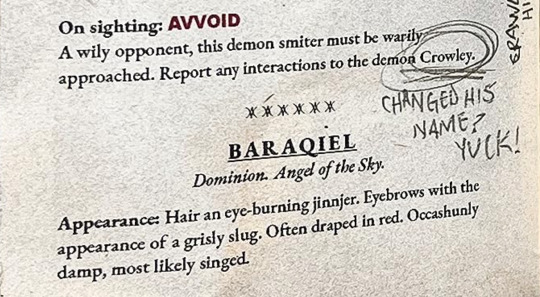
Thesis and evidence below the cut:
Dominion...
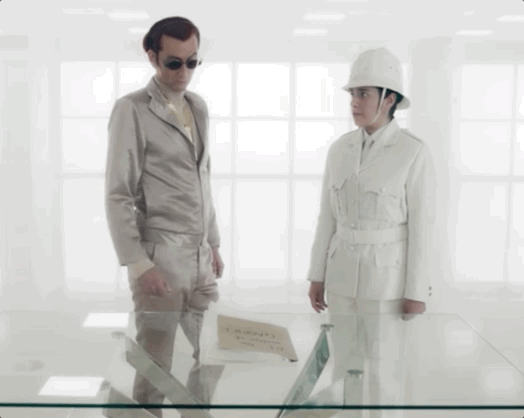
Angel of the Sky...

Hair an eye-burning ginger, eyebrows like grisly slugs, often draped in red…

Occasionally damp...
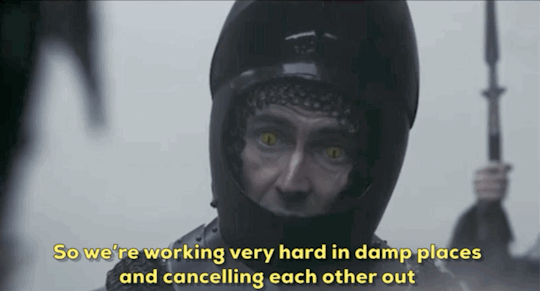
Most likely singed…

Most likely singed…
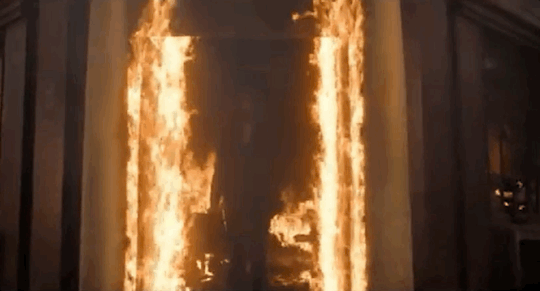
Most likely singed…

Most likely singed…

So that's everything from purely within Good Omens canon.
Baraqiel is described, additionally, in the Book of Enoch as:
Lord of Lightning

Who taught the forbidden knowledge of astronomy:

He is also the overseer of the Second Heaven, wherein lies the prison of Fallen Angels. More on that later.
The story of Baraqiel’s ejection from Heaven is contained in the Book of Enoch, but he’s not a main character. In fact, he’s only one of twenty major fallen angels, specifically, the ninth. The tenth is Azazel.
Who, then, is Azazel?
Firstly, Azazel is a fallen angel:
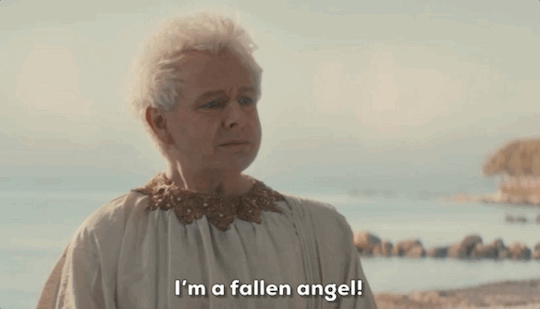
Who is damned because he introduces humans to forbidden knowledge, specifically, the knowledge of swords [and other devices of warfare]:

And also the knowledge of adornment, specifically, “the art of making up the eyes, and of beautifying the eyelids, and the most precious stones, and all kinds of coloured dyes.”
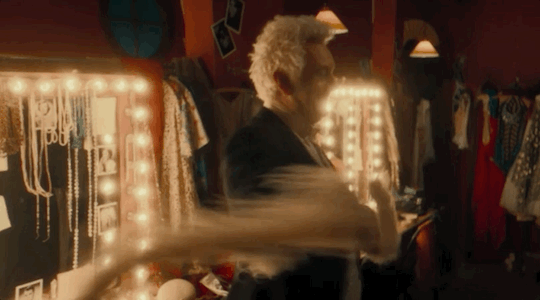
And insofar as Azazel is synonymous with Azzael, he denounces the authority of the Metatron:
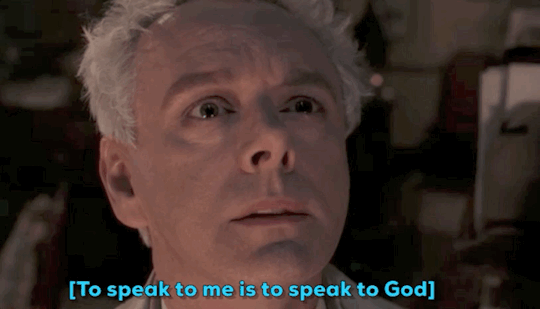
In fact, Azazel is given all the blame for revealing the secrets of Heaven: “the whole Earth has been ruined by the teaching of the works of Azazel; and against him write: ALL SIN.”
and God orders Raphael punish Azazel: “And further the Lord said to Raphael: "Bind Azazel by his hands and his feet and throw him into the darkness. And split open the desert, which is in Dudael, and throw him there.””
We never learn in the Book of Enoch that Raphael actually does this (based on my reading), but it was commanded. In fact, Raphael would have had to throw Azazel into that prison which was in the domain of Baraqiel.
This puts Baraqiel!Crowley and Azazel!Aziraphale among the ranks of angels that went to Earth and delighted in Earthly pleasures, which caused them to be “fallen,” that God refused to speak to from then on, that Enoch!Metatron was ordered by God to tell that they were unforgiven and would never be forgiven.
It’s worth noting that there seems to be some disagreement among rabbinical scholars over whether Samyaza, Azza, Azzael, and Azazel are separate entities or if these are different names for the same entity. We should also remember that in the universe of Good Omens, entities change names when they ascend to or fall from Heaven.
Tying this all back to the Metatron: In 3 Enoch, the book which describes the ascent of Enoch the man to Metatron the angel, we learn that the overseer of the Second Heaven is Baraqiel, angel of lightning. The description of the prison in the Second Heaven and the angels trapped within it is terrifying, but not more than Enoch’s own actions when he is there.
At this point Enoch has not been transfigured into the Metatron yet, but when he passes by, the angels ask him to pray for them to the Lord; and he refuses, for “who am I, a mortal man, that I may pray for angels?” He is told about them again in the Fifth Heaven, about their sins, how they followed Satan, and that they will be punished on Judgment Day.
So we have a lot of reasons here to see that there would be enmity directly between the Metatron and Azazel, for questioning his authority before God, and between Baraqiel and Enoch!Metatron, for either Baraqiel was guarding the prison or already in it when the human who would become Metatron was supplicated for prayers of redemption and refused. Either way, the Metatron is responsible for Baraqiel’s fall, most directly because he refused to take the petition of the fallen angels before God and instead relied on his interpretation of a dream.
There’s been a lot of implication and even exposition throughout S2 that memory is vulnerable to erasure. We’ve gotten some direct hints that Crowley doesn’t remember all of his past, but I would venture to propose that Aziraphale has a very troubled past that he does not remember, that the Metatron (and possibly Crowley) does, and that further, because his memory was [partially] removed, his name was changed to Aziraphale, for which we see precedent in Jimbriel and all the demons.
My absolutely unhinged, unsubstantiated S3 prediction is that Angel!Crowley sacrificed himself to rescue Azazel from damnation, and the price of Azazel remaining an angel was losing the memories of his transgressions, including (and especially) those he formed with Angel!Crowley. That at the Garden of Eden, Crawley!Crowley knew that these things had been erased, and that he was probably talking to a husk of his former friend, the way that Jim was a husk of Gabriel, but that when he learned that Aziraphale had given away the sword, realized that the soul of the person he loved was still in there.
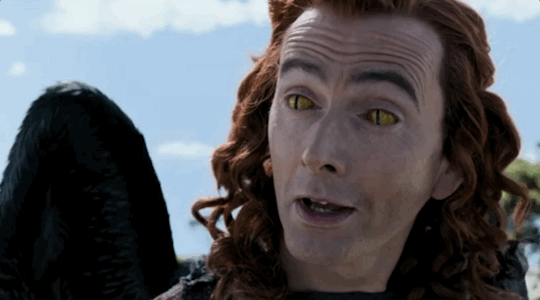
Partner post: For a meta on why we should believe that Enoch!Metatron aka Human!Metatron is a possibility, go here.
Edit: I read the Book of Enoch from front to back, twice, but if you want to check my work (or write a response meta!) you can find the source material here and here.
If you liked this husbands-centric meta, you may like A Nightingale Sang in 1941
If you liked this historic event speculation, you may like Sodom and Gomorrah
#good omens#good omens 2#good omens meta#ineffable husbands#aziraphale#crowley#metatron#good omens theory#baraqiel#azazel#book of enoch#this took a really long time you guys so please leave a note <3#ivoc#erasure theory
768 notes
·
View notes
Text
Angels & Man, a queer retelling of the Watcher's Flood, is now available for ebook pre-order
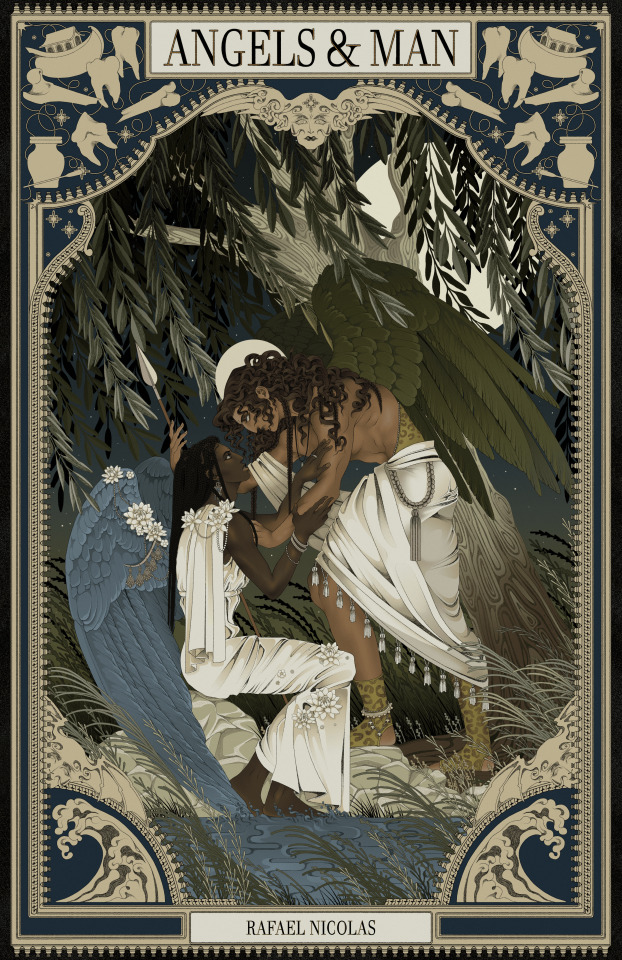
with a beautiful illustrated cover by the incredible Hyde Angelus @iliothermia and a back designed by Alex @swordvampire.
Angels & Man is a queer retelling of the Genesis Flood // Noah's Flood // the Book of Enoch // the Book of Giants in which:
The angel Azazel is miserable in Heaven. In the aftermath of Satan's fall, the angels live in the reconstructed ruins of an old utopia, oppressive and paranoid of any new rebellion.
The angel Samyaza is content in Heaven, but he longs for the eternal city's former glory. Watching the feeble humans below, wallowing in sin for centuries after Adam and Eve, he sees opportunity to earn back the Lord’s favor.
On Earth, the Watcher angels arrive to lecture on God's love, but the love of a human soon begins to seem much warmer.
It's the sequel to Angels Before Man — a queer retelling of Satan's fall — and the second book in the Angels Trilogy — a series of books about gay angels and the end of the world.
Paperback / Hardcover are coming soon (it always takes me a while to get them set up but I'm hoping ). While we're at it, please look at the cover illustration for the hardcover dust jacket by @siroc-co :
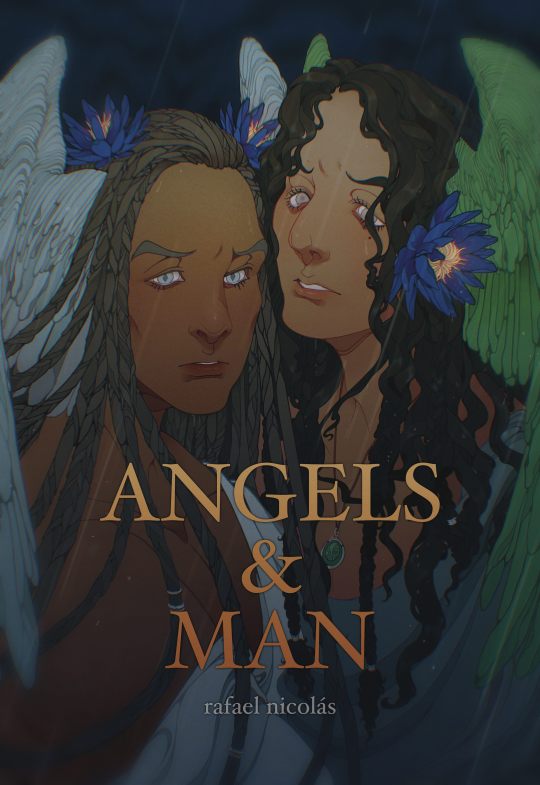
I want to sap about how hard I've worked on this and how grateful I've been for your support :( It means a lot to me. Thank you all. But let me leave the content warnings here for now:
Graphic violence, death, depictions of oppression, body horror, pregnancy and miscarriage and childbirth (including for character that does not identify as a woman), sexism, homophobia, bigotry, sexual content, non-graphic sexual violence, issues of sexual consent, incest, depictions of war and starvation, emotional and physical child abuse and neglect, suicide, mental instability, self-harm, abusive romantic relationships
#mine#angels before man#angels and man#angels trilogy#queer books#lgbt books#writing#indie books#book
278 notes
·
View notes
Note
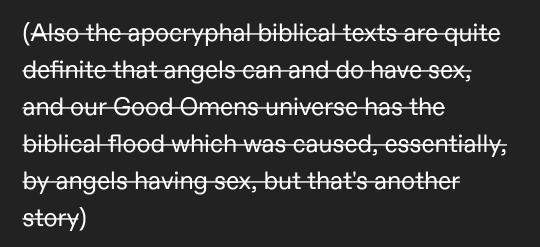
Hi, no babe, I'm sorry, you can't just cross this out and then leave, what the fuck does this mean??? Get your ass back here and explain yourself?????
Oh my friend! Settle in for the story of the Book of Enoch! It's an apocryphal Hebrew text, excluded from formal canon (Jewish and Christian) but still considered canon by some Ethiopian Orthodox churches.
Crib notes version: 200 angels decided that human women were hot and made a pact with each other that they'd down to Earth, take them as wives, and make babies with them. Their sins included fornication and distribution of forbidden knowledge, including sorcery (okay, fair) and cosmetics (because God doesn't like it when people get tarted up, I guess).
Their children were the Nephilim, which has been translated as giants. These human-angel hybrids consumed all available resources and then turned on each other in cannibalism. God got pissed off and decided to send a flood to kill everyone but Noah BUT ESPECIALLY TO KILL THE NEPHILIM. Like, that's the reason the flood HAPPENED, THAT'S the sin God was mad about.
Additional points: the messenger between God and these bad angels is Enoch, Noah's grandfather. Enoch later ascends (God plucks him up, takes him to Heaven and sticks wings on him, literally this is what happens) and gets renamed as:
(ominous music)
THE METATRON.
#book of enoch#it's all connected in a massively fucked up way#i am FASCINATED that they decided to use Metatron to break Aziraphale and Crowley up specifically because of his involvement with this story#the moral of the story being Angels Having Sex Is Bad#good omens#sort of
733 notes
·
View notes
Text
Who's THE Devil?
You know, from, like, The Bible?
One of the things the various takes on Hell more or less agree on is that there is one demon among the legions of Hell who more or less reigns supreme - The Devil with a capital The. What they rarely agree on, however, is which devil that is. So, for funsies, let's look at all the candidates for The Devil, shall we?
Belial
The concept of demons arguably predates Abrahamic religions, at least if we take it at its most nebulous definition of "supernatural people from an Other world who are somewhat antagonistic toward humanity." But the more specific and probably more familiar version of them began with The Book of Enoch, one of many texts that were deemed non-canonical by Christians yet still holds a great deal of influence on Christianity as a whole. It's an extended account of the Noah story, positing that a group of angels rebelled against heaven because they wanted to sleep with mortal women, and created a race of giant half-human half-angel offspring called the Nephilim (Goliath, of David and Goliath fame, was one of the nephilim). God wasn't happy with this, and sent the rebel angels to a fiery pit before killing most of the nephilim with the big ol' flood (though Goliath's lineage survived somehow I guess).
It's not quite how most people picture the War in Heaven and rebellion of the angels, but it's nonetheless where that story started, and that makes it important. This is the first take on what would become the classic origin story for demons and Hell itself. And who is the leader of the rebel angels in this story? Why our good friend Belial, of course. Belial would remain a prominent demon from hereafter, but despite having the earliest claim for the crown of The Devil, Belial has not remained the frontrunner in the race, and is generally demoted to just being a high ranking demon, rather than the Highest ranking one.
2. Beelzebub
I've talked about Beelzebub before and I don't want to spend too much time rehashing that post, so brief recap: Beelzebub began as a mean nickname for a god from a rival religion to Judaism who was named Baal Zebul, which means Lord of the Heavenly Place. Baal Zebub, by contrast, means "Lord of the Flies." Eventually Baalzebub becomes Beelzebub and, divorced from the original context of its creation, becomes a character in his own right, being a prominent demon. And because Beelzebub appeared in a lot of texts, many of them very old as demonology go, he became a major competitor for the title of The Devil, and remains so to this day. I think it's partly because the name "Beelzebub" is really fun to say, but the sheer history and volume of demonology texts portraying him as a big, powerful devil also help. In the rare stories where Beelzebub appears but does not get to be The Devil, he's still portrayed as fairly high ranking, with both Milton's Paradise Lost and Marlowe's Faust making him The Devil's right hand demon, second in command of Hell. So even when he loses the crown, Beelzebub takes home a good silver medal
3. Asmodeus
Asmodeus is another of our "predates Christianity" demons, right up there with Beelzebub and Belial, and as far as I can tell from what I've read he was originally intended to be The Devil rather than just a devil. It's kind of right there in the name - "deus" means god, so Asmodeus having that name marks him as a demon who thinks himself equal to God.
(well, ok, there's some debate about the full origin of his name, with some arguing the "deus" part was originally a play on "deva," which in turn is loosely translated as... demon. The fact that Asmodeus's name is pronounced/spelled differently to a preposterous degree is part of why the water is so muddy - Asmoday, Asmodai, Asmodee, Osmodeus, it goes on and on)
One of his better claims to the crown comes from the story of Solomon - you know, the wise king who told people to cut babies in half. Solomon's less canonical feats include enslaving a shitload of demons to build a temple for him by way of the rite of exorcism, using a magic ring and the power of Christ to compel the damned to do manual labor for him. Asmodeus is specifically stated to be the strongest demon he summons in part because he is the King of all Demons, i.e. The Devil - and the other demons weep at the sight of their king being reduced to a slave by mortal hands.
Why is this a strong claim? Because the story of Solomon in turn inspired The Lesser Key of Solomon, a text about using the rite of exorcism to summon and use demons to do your bidding. The Lesser Key of Solomon includes the Ars Goetia, which is basically a big ol' bestiary of demons, and where many of your favorite pop culture demons - like, say, Stolas the owl guy - come from. Being the King of all demons in the story that inspired one of the more thorough and exhaustive lists of demons and their hierarchies should count for a lot.
There's one other great claim to fame Asmodeus has in his favor. While not directly named in Dante's The Divine Comedy, the description Dante gives of Satan's physical appearance matches with the most popular descriptions of Asmodeus - in particular, his three heads, one of which is yellow, one red, and one black. Granted, it'd be more of a smoking gun if one of those heads was a bull and the other a goat, but they're all very ogre-like, so I still think it stands. Dante's Devil is, more likely than not, Asmodeus, and that's a BIG point in Asmodeus's favor.
4. Hades/Pluto
Ok, so, a great deal of the Old Testament was originally written in Greek, and the New Testament was written in Latin, both of which happened when belief in the Olympian Gods was pretty strong. As such, the word "Hades" appears in the Bible a lot when talking about the place where dead people go, though it probably wasn't meant to literally be the same underworld as that in Greco-Roman mythology. Probably.
But because Christianity was spread primarily by the Roman empire once they converted to Christianity, and because Europe ended up getting a centuries-long case of stockholm syndrome for the Roman Empire that involved many people in power declaring that Greco-Roman mythology was super important literature and Latin was the language of God Himself, there is a good chunk of Biblical apocrypha that treats the use of Hades as, well, a literal crossover of sorts. Which is to say that Hades the god is sometimes treated as, like, a figure in Christianity, generally a demon specifically. And because he's, you know, Hades, from, like, The Odyssey, people feel he needs to be prominent. I mean, Hades RULED the underworld in Greek mythology, so if we're stealing him for Christian folklore, he should at least be in upper management, right?
The strongest case for Hades being The Devil comes from The Book of Revelation, one of the few books in the Bible that actually contributes to demonology (despite what people tell you, demons really don't show up in the Bible that much - most of what we think of as iconic demon lore come from non-canonical works). You know the four horsemen of the apocalypse? War, Famine, Plague, and Death, right? HA, WRONG! It's Conquest, War, Famine, and Pestilence & Death, you fake horseman fan. Well, anyway the line that introduces Death/Pestilence & Death ends with "And Hell followed with him." Except, no, not really, because the specific word used is... Hades. "And Hades followed with him." Which, depending on how you want to interpret the line, could very well mean a literal, King of the Underworld Hades.
Of course, the problem with using Revelation as proof is that Revelation itself is pretty unclear on who's leading the forces of evil. Is it the Seven-Headed dragon who's cast out of Heaven at the beginning of the end of the world? Is it the seven headed leopard monster that the dragon gives his crown to? Is it the monster who crawls out of the ground to speak for the seven-headed leopard with the voice of a dragon? Is it Hades? Is it God, the one who's allowing all this violent shit to happen and frequently sending his angels to make it way fucking worse? Who can say.
So, while it's not super common, there are more than a few works where The Devil is none other than Hades himself. Disney... might not have been completely off the mark, I guess?
While I think Hades's claim is pretty weak, I should note that one of the works that puts a LOT of Greek mythology into Hell is none other than Dante's The Divine Comedy. 70% of the demons in Dante's Hell are just Greek monsters, with the remaining few being Asmodeus and some OC demons he made up with portmanteu names a la Pokemon. Notably, Hades is one of those demonized Greek figures - presented as the Judge who decides where in Hell sinners end up based on their crimes. He's not The Devil, though, so while Dante kind of helps Hades's case, he also kind of ends up making a counter argument to it.
5. Abaddon/Apollyon
Ok, so, the word "abaddon" is used in some texts to refer to Hell, and sometimes it's personified as well. It literally means "ruin." Well, in time, Abaddon is personified and become a demon, which should feel like a familiar story to you by this point. And because Abaddon can also literally be Hell itself, it's only natural that some stories posit Abaddon the demon as the rule of Hell, much as Hades is the ruler of Hades in Greek mythology. This is Abaddon's big claim, and it's not bad, but it's not super strong. Nonetheless, it was enough for at least one prominent Christian text, Pilgrim's Progress, to make Abaddon (under one of his synonym names, Apollyon) to be The Devil, so we can give him that too.
6. Sheol
The sections of the Bible that are written in Hebrew use the word "Sheol" to refer to the underworld/afterlife rather than Hades. Now, Judaism doesn't have the same Hell as Christianity, or the same concept of Heaven either for that matter, and Sheol is less a place of torment for the damned and more of a waiting room for the dead to hang out in until the Messiah comes.
Nonetheless, Sheol did get personified like Abaddon and Hades, and that personification (which, in some versions, is a batty old lady, which is fun) later became a demon in its own right, and thus, for the same reasons as Abaddon and Hades, has a claim to being The Devil by dint of also being, you know, Hell itself. Not the strongest, most popular claim, no, but a claim nonetheless.
7. Satan
Feels rather obvious, doesn't it? Ok, so, in The Bible, one of the characters who was retconned into being The Devil is the angel in the Book of Job who takes on the title of Satan. In the original context of the story, "Satan" is not a name, but, again, a title - a job title, really, roughly akin to "prosecuting attorney." The Satan in the Book of Job isn't a rebel angel, but an angel whose job is to argue for the opposing view point to make sure everyone is doing the right thing. Less "The Devil" and more "the devil's advocate."
But! Christians fucking LOVE the devil, and they want more devil in their Bible, so many translations treat (the) Satan not as the hard-working servant of God he was originally written as, but as, you know, The Devil, arch-enemy of God and justice. And so Satan becomes synonymous with The Devil, and over time more and more appearances of The Devil give him the name Satan.
I can see an argument for this being the strongest claim, because the sheer amount of works where "Satan" is treated as The name of The Devil is enormous. But I think it's important to note that many of those works actually treat it as a name for the devil, which is to say, not the only name. I guess a lot of modern works think the name is so commonly used that it lacks its punch, and so they have The Devil pull the "I have many names" schtick to sound more imposing.
8. Lucifer
So there's a part of the Bible that talks about a star falling out of Heaven as a sort of metaphor for how people can fall from grace. Well, good ol' King James translated this as not just a falling star, but specifically The Devil himself, giving him the name Lucifer, which means "light-bringer." The King James translation of the Bible is bad in that it's immensely inaccurate, but good in that it's a beautiful piece of poetry in its own right, and since it had the authority of a goddamn king behind it, it quickly became a prominent Christian text and is still the preferred translation of many Christian sects to this day.
So, you know, that's pretty fucking big as claims go. There is one incredibly prominent (if woefully inaccurate) translation of the Bible where Lucifer is The Devil. Kind of hard to fight that one.
But it doesn't end there! I would argue that the most influential origin story for Christian devils, the one that has become ingrained in the cultural consciousness as THE story of the War in Heaven, is Milton's poem Paradise Lost. That's where most of the tropes we associate with The Devil and demons and Hell really come together to form the great devil mythology - well, it and Dante's The Divine Comedy, anyway. You know which name Milton chose for The Devil?
Lucifer.
Well, ok, he also calls Lucifer "Satan" with about equal frequency, but still - Lucifer is The Devil of Paradise Lost. And because of the sheer weight that both Paradise Lost and the King James Bible have in culture, Lucifer has ended up being used as The Devil in countless works since! Not bad for a translation error, right?
While the sheer number and notability of literature that uses Lucifer as The Devil is kind of argument enough for him having the best claim, I'd like to add one more argument in his favor: dramatic irony. I think what draws people to Lucifer is the meaning of his name - "the light-bringer" - and how it contrasts with his role as the king of a pit of darkness and misery. "Light-bringer" is a heroic name, the name of a character who brings hope and joy, which makes it so delicious when it turns out our "light-bringer" is an utter bastard. It's just irresistible, isn't it?
9. Mephistopheles
A good number of demon stories - arguably the majority of them - focus on mortals who make deals with demons and end up damned to Hell for doing it. We call these stories "faustian pacts," and we do that because the most famous story of this kind is the story of Faust, a scientist/alchemist who makes a deal with a devil named Mephistopheles to learn the secrets of the universe and ends up doing a lot of sinning in the process. Since Faust is such a famous and influential story, it only follows that its main devil is frequently viewed as The Devil.
...except
In most versions of Faust, Mephistopheles is not presented as The Devil within the narrative. He's a henchman, a flunkie, with one of the bigger names like Lucifer or Beelzebub pulling the strings. So while there are a number of stories (including a few versions of Faust itself) where Mephistopheles gets to be The Devil, it's far more common for him to be a devil - perhaps a prominent devil, maybe even one of the strongest and a close member of The Devil's inner circle, but rarely the one in charge.
10. Baphomet
Baphomet is a god whose name and appearance was repurposed as a demon by The Church of Satan, and so while I have to admit that is a claim to the crown, I don't think it's a great one. First, nothing about the Church of Satan's belief system is meant to be taken genuinely, with them admitting that they view Satan/Baphomet as a symbol rather than a literal supernatural being they believe in. Second, by rights Baphomet should be allowed to be Baphomet instead of being literally demonized. I honestly think it's better for Baphomet to lose this race than to win it.
11. Iblis
Demons in Islam work differently from demons in Christianity. Rather than being fallen angels, demons are wicked Djinn - a race of people made from fire and smoke rather than ash and dirt like humans. Djinn aren't quite as powerful as angels in Islam, but do have significant supernatural powers that humans lack. Like humans, Djinn have free will and can choose whether to be good or evil - and those that choose to be evil reside in Islam's version of Hell, where they are ruled by Iblis, the first Djinn to choose the wicked path and the ruler of Islam's Hell.
Unlike Christianity, there isn't really any debate on this. Iblis is, for all intents and purposes, the CANONICAL ruler of Hell, The Devil of Islam, and thus has the strongest and really ONLY claim to be The Devil of that religion.
...but, at the same time, Iblis can't really be the Christian devil, because Christianity doesn't have Djinn, and all the iconic parts of Christian demonology kind of hinge on the idea of demons as rebel angels, which demonic djinn very much aren't. So while Iblis's claim in Islam is irefutable, he doesn't have one in Christianity. Ain't that wacky?
I think it should be noted that there are more-or-less canonical texts where Iblis isn't treated as purely evil, either, including one where he actively asks for help in repenting and is turned down because, well, evil has to exist, and someone has to rule over it, and like it or not, that's Iblis's job now. It ends with Iblis wailing that he has become the greatest martyr of Islam. Which is so fucking hardcore, I love it. In Christianity, the texts where we humanized demons are non-canonical at best and deemed heresy at worst, but Islam allowed it to be more-or-less canon. They saw the coolest takes on the Devil and said "yeah we can allow that" - so much more rad than what Christianity did with them.
~
~
~
So, who do YOU think is The Devil? You know, from, like, The Bible?
246 notes
·
View notes
Text
Archangel Raphael
Is it Crowley? Is it Aziraphale?
What if I said he is the both of them?
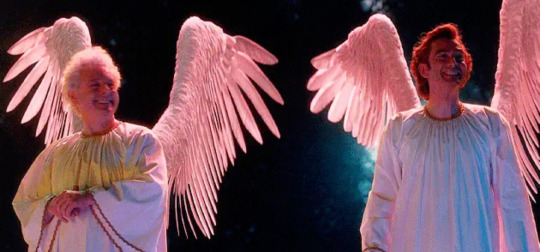
I know a little out there thing to say but it’s a theory i’ve had hanging around in the back of my head for a while now because the thing is,
Crowley seems to have held the rank Raphael has but Aziraphale shows more of his actions.
These two theories have been around for a while and at no point am I trying to take away from what people have put together. This is just for fun and silly purposes. and I wasn’t kidding when I said I’ve had this theory for a while and just didn’t know how to put it in words so it might not be the best.
But let’s just start with who is Archangel Raphael
Raphael
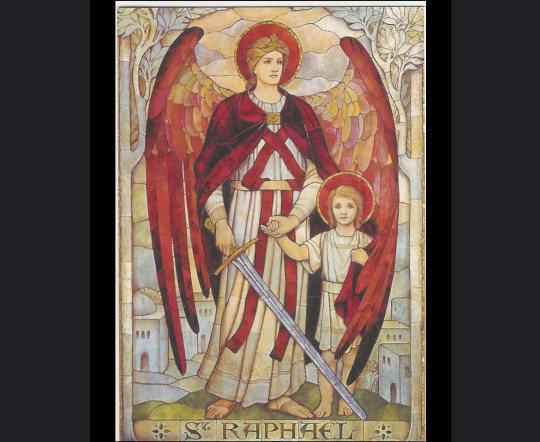
The Angelic Prince of Healing
Well let’s start at the beginning, or well before the beginning.
According to the Midrash Konen, before he was Raphael he was the angel Libbiel.
In this God gathers all their angels before Adam is created and hears their opinions. While some angels praised God for their creation others spoke out against it. The Angel of Love and the Angel of Justice were both in favor while the Angel of Truth and the Angel of Peace both objected.
For this the Angel of Truth is cast out Heaven by God. God then summoned a band of angels under Michael, Gabriel, and Libbiel. Both of the bands under Michael and Gabriel scornfully called out against the creation of man and were too cast out. Libbiel seeing what happened to those bands warned his own to call out in favor of creation of man and thus was rewarded with the new name, Raphael, for his efforts.
Raphael, the rescuer, Angelic prince of Healing.
This is just one story of Raphael, if we take a step outside religion but still the very important book, Paradise Lost by John Milton, we can find Raphael there as well.
He is the angel that comes to Adam and Eve in the Garden of Eden to warn them against temptation. Through him we hear about the rebellion and war in Heaven. He eats with Adam and Eve and doesn’t just directly quote God but rather shares his own views and opinions.
An interesting and very important take on Raphael but let’s just jump back into the religious stuff.
In the First Book of Enoch he is the angel over the spirits of men and set over all diseases and wounds. He was instructed to bind Azazel and heal the Earth that has been corrupted by the Watchers.
In the bible Raphael was one of the three angels that appeared to Abraham in the oak grove of Mamre. His task was the heal Abraham and save Lot. (Genesis)
Though not identified with name he is credited to be the angel who periodically stirred the pool of Bethesda (John)
His main story though comes from the Book of Tobit. He acts as a guide on Tobias’s journey to Sarah disguised as a human peasant. On this journey they gut a fish that they then end up later using to expel the demon, Asmodus, and heal his father, Tobit. This is the story where most of his depictions come from including the one above.
In Jewish text, under the name Israfil, he is depicted as the angel who stands eternally with a trumpet on his lips waiting and ready to announce the day of judgement.
Wooh that was a quick run down. (pls correct me if any of this was wrong) But moving on for now.
Title Sequence
Disclaimer: Not main supporting evidence. Secondary at best. Really just something interesting that didn’t fit anywhere else.
Now before we get into how this all connects in the show I wanted to make stop to point out something from the s1 TS that I have never been able to explain away.
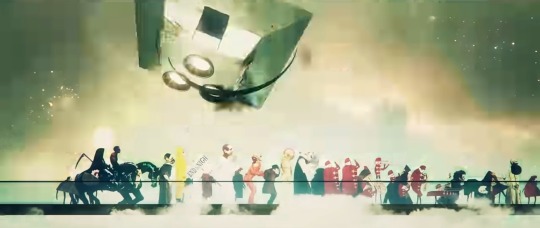


Both of them getting sucked up into the spaceship and then it burst into fish.
Fish huh? Interesting…
Gabriel’s Trial
This is the part that gives us some of the biggest pieces of evidence for a Very Highranking AngelCrowley.

Before we even get to the trial we have Crowley able to get into the file that only a throne, dominion, or above could access.
Then we have Gabriel saying he is “the only first order archangel in the room, or yknow the universe” with the immediate cut to Crowley. Visually this is a very obvious signal that this is something to pay attention to, foreshadowing that something is not right with this statement.
The clip above also gives us that this being would have been considered a Prince of Heaven.
Michael, Gabriel, Raphael, Uriel, and the last three kinda vary. But we are just going to focus on these four anyway since that seems to be the number the show likes.
The only one missing from those four is Raphael and it seems that the Metatron still holds quite the grudge and memory of this being….*cut to Metatron glaring at Crowley*
But there is also something else we learn in this Trial.
That the name Gabriel is tied to his angelic status, a name he was about to lose along with his memories. A name he does end up losing while he doesn’t have his memories, getting replaced with Jim.
But one thing I did want to mention in this section before leaving, even if it didn’t happen during Crowley’s trip to Heaven, was when Michael says “there is always a Supreme Archangel.”
All of this has some very interesting implications of what happened in the past, and let’s not forget that Aziraphale was battling demons while all this was happening.
Now though that this has all been laid out let’s get into the meat of this.
Aziraphale and Crowley
yknow for this being about them I haven’t talked about them a lot lol. But let’s start at the beginning of them, the time one became two.
Originally they were written as one character, a fallen angel, until it was eventually changed into the two characters we know and love, Aziraphale and Crowley.
Now I’m not claiming to know what was going on in their heads during the creation process, just that the absence of a single prominent archangel when they were originally a single character is…interesting.
but that’s what got me thinking.
In Before the Beginning there doesn’t really seem to be a rank system more along the lines of groups that have certain jobs in the creation process of the universe. Not saying there wasn’t a ranking system but I doubt it was as large and complex as it is in present day.
However there is no denying the parallels that Gabriel and Crowley play to each other, particularly with their Angelic Ranking.
So what I’m proposing is that yes, Crowley was a very high ranking angel, perhaps on the same level as Gabriel - an angel named Raphael.
But he Fell, his name taken away from him in the process and he became Crawley.
With this though it left a space open, a Raphael shaped space up in Heaven and History. The Job of who Raphael was supposed to be.
A job that another certain angel seems to take up through his actions, Aziraphale.
Aziraphale’s name quite literally means “helper of Raphael” which technically he did do when he helped start up the star factory.
but even in that moment it was the two of them doing a job that was supposed to be only meant for one.
It’s a theme they continue throughout their years together, they cancel each other out, they take to doing each others jobs that never tip off the other side. They are the most powerful when they are working together, helping to stop Armageddon and the 25 Lazarii miracle they perform together. Two sides of the same, single coin.
The spot for Raphael was only meant to be held by one, the place Crowley held before the Fall. The place Aziraphale took up in the aftermath. There is always a Raphael.
However one does not just lose the power of being a first order archangel hence why Crowley is still so powerful.
The only one to realize this - The Metatron and well probably God too. Hence the need for at least Aziraphale back up in Heaven, as well as just keeping an eye on him.
and this really all just makes me want to point out that after Armageddon was diverted and they were out there on the bench and Crowley asks if God,
“Planned it all like this, very beginning.”
and I can’t help but say, yes. Two angels designed for the same role, one fallen and one not. Together they are complete and bound through history. Together they are the most powerful. 
#good omens#good omens 2#aziraphale#crowley#aziracrow#good omens meta#good omens theory#good omens speculation#good omens analysis#archangel raphael#could i care less about what crowley’s angel name was? yes. this is just a silly little theory#the likely hood of this playing out is very slim
102 notes
·
View notes
Text
Metatron's Tie

**Update: check the reblogs. There's a clear picture that shows the tie pattern as flowers. So, there goes my theory. Whomp whomp. Easy come, easy go, as Freddie says. @archangelween @drconstellation
People, I have been trying to get a good look at the Metatron's ding dang neck tie since September to determine what those little blue symbols are. Because, like everything in the Good Omens universe, I believe it's been put there for a reason. I also believe that God has no idea what she's doing, which is why she hired Neil Gaiman to run things for a few decades.
Despite being a so-called agent of Heaven, the Metatron's costume is coded as demonic, from his dark topcoat to the black stripes on his white shirt. The item I find most fascinating, however, is his tie. And this is probably in large part because I've had so much difficulty seeing the subtle blue pattern upon it and that has made my brain itch and made me hyperfixate. As one does.

I think I may have figured out the design, and it complicates all my Metatron theories, but here we go. The Metatron's tie is black, featuring a repeated small bright blue symbol throughout. I've guessed it could be a star or a planet. A cryptic sigil or maybe something to do with the coffee (I'm not a coffee-theory person, though, for the record.) I don't know what it is (well, maybe I do now, and I promise we'll get there in time...I'm a demon of my word), but I do know that it's important.
All the angels have references to their angelic status concealed within their costumes.

Michael is the watcher. She is the one who, in Saturday Morning Funtime, delivers surveillance photos to Gabriel. To reflect this, Michael wears a gold ring featuring several small pearls that symbolize eyes. She is ever-vigilant (hyper-vigilant, ya might say), and even has a contact in Hell (Dagon) to broaden her scope of observation. The placement of the ring in the pinky is also significant. A good watcher mustn't themselves be observed, so Michael, in her role as observer must slip under the radar. This corresponds to the pinky finger being small and quite literally underhanded, as in at the bottom of the hand.

Uriel's ring is a silver star, worn on her/their index finger, the digit associated with authority. (We call it the index finger because we use it to sort and catalog, creating meaning and order.) Uriel certainly commands authority, both in their overall calm and assured demeanor, and also in their actions. It is she who physically confronts Aziraphale prior to the S1 No-pocalypse, easily inspiring fear in the Principality. As for the symbol of the star, I believe it is a reference to modern Angelography (I might have made up that word, but I think you know what I'm talking about) which usually describes Uriel as a sun, star, or the flame of the Almighty.

Sandalphon's symbology is two-fold: a thick gold pinky ring featuring a pair of circles (kind of looks like a lego brick, to be perfectly fair) and that small gold grill he wears on his front teeth. Both these items are the most elaborate pieces of angelic adornment that we see. Sandalphon's overall aesthetic is much warmer than the other angels', leaning toward caramel and tan rather than dove gray. He's a bit of an odd ball in the host of Archangels and stands out based on his wardrobe choices alone. He's also the only Archangel not to return in S2. I don't want to make too much of this, because there are many in-universe reasons why we may not see Sandalphon again. However, in Judeo-Christian scripture, Sandalphon is closely joined with...wait for it...the Metatron, with apocryphal texts describing him as Enoch's (the Metatron's pre-angelic human name) twin brother. I take this with a hefty spoon of salt, though, since Neil definitely plays loosey-goosey with these dogmas and even the scriptures themselves are a veritable soup of contradiction. (The Bible is not a static or universally canonical text, and Hebrew scriptures, outside the Tanakh are a web of activity and debate as to what is accurate. I'm not here for the arguments today; this is not my Bat Mitzvah.)

Finally, we have Gabriel, the only Archangel who doesn't wear a ring. He does, however, wear a watch. I have two thoughts about the watch. First, clocks are thematically relevant in the Good Omens universe. From the grandfather clock in the bookshop to Crowley's elaborate wristwatch (which he has in both show and book) to the opening sequence of S1, which has far too many clock faces to count. So there's that. But holding time in one's hand (or on one's wrist) is a powerful metaphor that illustrates control and higher power. To possess a clock is to command time and space which are essentially inseparable. As the Supreme Archangel, Gabriel is nearly the top-ranking being in the universe (for a time, at least...see what I did there? pathetic laughter) and his wristwatch demonstrates this point.

If you're still with me, you're doing great. Good job.
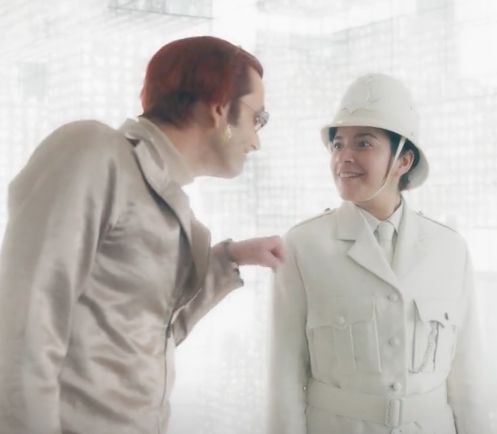
We've got to see how important the Archangels' symbology is to their characters, I think, to really understand why the sigils on the Metatron's tie matter. So, finally to the point. Dolphins. Thanks for coming to my TED Talk.

To move forward, we'll need to call upon my old friend, the Tarot deck. Cards, in general, and Tarot, in particular, play a marked role in the GO universe. The Almighty Herself addresses the viewer in the opening lines of the show, "God does not play dice with the universe; I play an ineffable game of my own devising. For everyone else, it's like playing poker in a pitch-dark room, for infinite stakes, with a Dealer who won't tell you the rules, and who smiles all the time." As God speaks, cards appear on screen, and some of those are from the Rider Waite Tarot deck. One specific card that caught my eye in this montage is "Judgement."
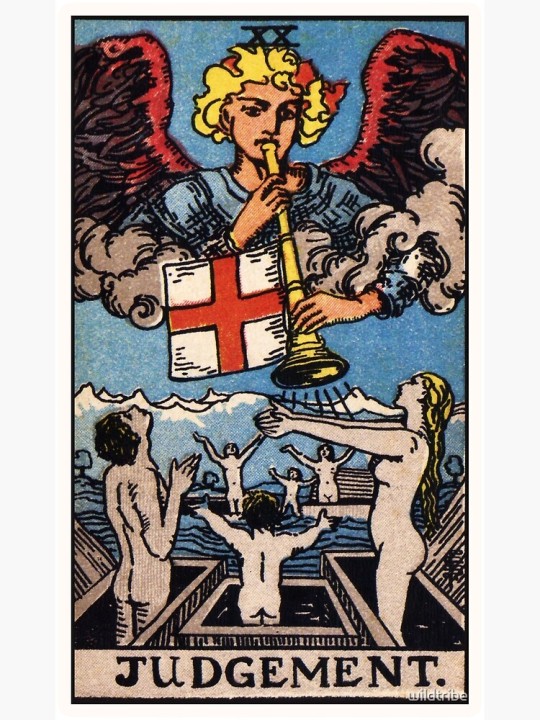
This card features an angel blasting a trumpet and waking the dead from their graves on the Day of Judgement. The angel on the card is not named, as such. It's usually assumed to be Raphael, as he is the angel who is prophesied to call and raise all souls on this day. However, I've found other references naming the angel as either Gabriel or the Metatron. Now, I don't want to get overly carried away here, but in the context of Good Omens, reading the Judgement card with the Metatron as the angel pictured may actually make a lot of sense, and clarify the sigils on the Metabutt's tie. The Metatron postures himself as the Voice of God--the Mouthpiece of the Almighty. Kinda like a trumpet, yes?
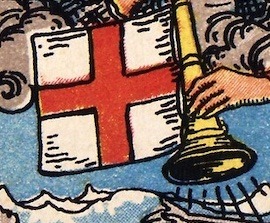
Now look at the flag on the angel's trumpet. That's called St. George's Cross and it's a very prevalent European Christian symbol dating back to the Middle Ages. Like many images in the Tarot, it's a heraldic emblem that has meaning outside the deck, often associated with bravery and military might. It continues to be used in military iconography into the present day. The Judgement that the angel heralds is not peaceful. It's a call to war. The righteous will be gathered to Heaven and the wicked will be destroyed--a repeat of the first Great War in which Satan and the demons were cast into Hell. In the narrative of Good Omens, this war will bring about the end of time, the end of the world, and the beginning of eternity (hope ya'll like The Sound of Music.)
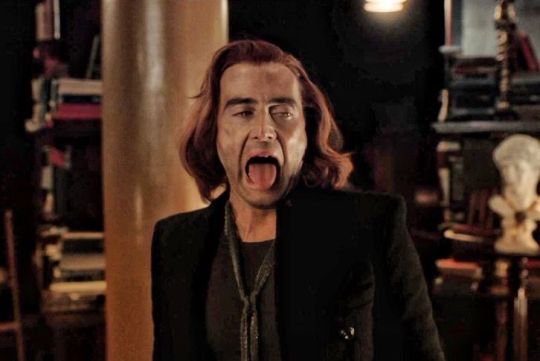
Kids (human and goat, alike) I think those little blue sigils on the Metatron's tie are Saint George's Cross. (I'm so sorry this is so small and hard to see. Now you know my pain.)

In the Final Fifteen, the Metatron speaks briefly about the Second Coming, which is a reference to Saint John of Patmos' prophecies--you might know them as the Book of Revelation. Some Christians interpret Revelation as an upcoming final judgement for humanity. And it seems, based on in-universe exposition, certain characters view these prophecies in a similar light. In the reverse body-swap at the end of S1, Crowley suggests that the averted Apocalypse was not the end of the conflict. "If you ask me," he says, "Both sides are gonna' use this as breathing space before the Big One. [...] For my money, the really Big One is all of us against all of them." And with the Metatron acting as the Mouthpiece of God, that "Big One," that Day of Judgement, if you will, may well be nigh.
I think the Metatron sees himself as the angel who rings out the Final Judgement. He is the Voice of God, after all. But here is a worrying thought. How little he would need to shift perspective to view himself as the Word of God, as well. The Gospel of John opens, "In the beginning was the Word and the Word was with God and the Word was God. The Same was in the beginning with God." The Word of God is an epithet for Jesus. The same Jesus whose Second Coming the angel of judgement is meant to announce. So what if the Metatron just plans to consolidate these roles for himself: the heralding angel and the Second Coming rolled into one. He would become Judgement Incarnate, supplanting the Almighty once and for all. And for my money, that sounds just like what a demon would like to do.
***I'm updating because several readers have pointed out that it seems like I'm saying Metatron=Demon because Demon=Bad. Thank you for bringing this to my attention--it makes me a better communicator. I can see where it's coming from. It's not my intention. Consider this meta sort of an extension of my "Metatron is the Murder Hornet" meta, which I'll link with the tags if you're interested.
Just wanted to clarify that I think at its heart, Good Omens is thematically about rejecting the dichotomy of good and evil and embracing the messy gray space that is reality.
When I call Metaboob a demon, it's not because I think demons are evil, it's because I think he's the hornet in the beehive and we've seen that demons need an angelic escort (Crowley and Muriel) to access Heaven.
TL;DR Angels are not the good guys. Demons are not the bad guys. Good Omens is NOT about that at all.
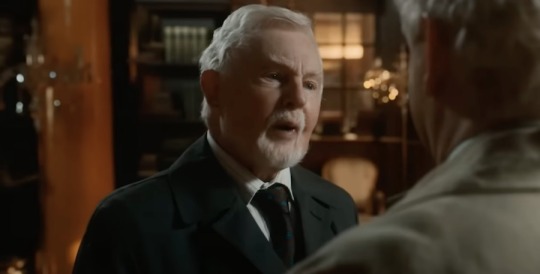
#good omens#the metatron#metatron#good omens 2#go metas#tarot#archangels#archangel fucking gabriel#archangel gabriel#archangel uriel#archangel michael#archangel sandalphon#good omens costumes#go costumes#youtube#metatron is a demon
181 notes
·
View notes
Text
The Hazbin Graduate’s Guide to Homicide (3)
HAZBIN'S MIDSEMESTER STUDENT REPORT
Student: Vox Vanhal
Supervising Staff: Professor Enoch Leviathan
Sponsor: Not Applicable
To the Board:
Vox Vanhal may be one of the most brilliant students this school has seen in decades. In all my years of teaching at Hazbin, I have never met a student more insanely ready to learn and apply their skills- due in part, of course, to said student's own possible insanity. I mean this in a jovial way, of course, but I will admit that when young Vanhal's true identity was revealed to me that my first thought was along the lines of 'is this student insane?' Whether or not my student's reason should be called into question is something myself and my fellow professor Asmodeus have discussed in length, but there is one thing that we can definitively agree on: If there is any one student in this school who I would choose to place my bets on, it would be Vox Vanhal. There is nothing more to say at this time of report evaluation.
Sincerely, Professor Leviathan.
May God's blessings be with you now and at the hour of our deaths, Amen.
[ 1 ] / [ 2 ] (<- read these first for context and more murder academy radiostatic content!)
Though Alastor may have thought that Vox was much more knowledgable in how Hazbin's Institution for Homicide worked, the truth was, Vox was still fully flying on the seat of his own coattails.
He had no damn clue what he was doing still, and although it'd been two weeks since he'd arrived, part of him still felt like how he did when he'd first arrived: hesitant, scared, not knowing where to go or what to do besides the want to make his boss suffer as he killed him.
That level of animosity might sound strange to anyone not a Hazbin student or alumnus, but it was perfectly normal for any student enrolled in the academy to have such feelings. After all, there was quite a rigorous process involved in the application, and for Vox, this application process (and what led to it) was perhaps more intense than most.
There had once been a time where Vox had dreamed of becoming a Hollywood starlet, one who lit up the silver screen and was blessed by hundreds of thousands of cheering, dedicated fans who would fawn over his every move and action. He'd wanted to follow in his mother's footsteps, at one point. But after taking on his first roles in Carmine Studios, the glamour of Hollywood had shattered like fine glass.
"Miss Vesper! Would you please look over here for a second?"
"Miss Vesper, when is your next movie coming out?!"
"Miss Vesper, is it true that you and your co-star on Anna Karenina, Valentino Vega had an affair-?"
"Fuck! Fuck, fuck, fuck! That- fucking bastard!" Vox rushed into the privacy of his and Val's shared apartment, slamming the door behind him as he collapsed into the couch, head cradled in his hands. He couldn't even begin to start detailing the number of ways he'd wanted to fucking butcher and rip apart his boss.
Andrealphus Goetia was no stranger to the spotlight, naturally. One of Hollywood's top directors, the man had been an influential cornerstone in the history of movie-making, a real legend to light the days. But behind that picturesque platinum reputation laid a monstrous piece of shit.
It had been a complete accident that Andrealphus had found out about Vox's identity.
Vox himself hadn't even really planned out what to do about himself at that point, only that he'd known that the dresses he wore on screen were far more suited to his best friend than they were for him. Knew that the copious amounts of makeup flattened on him everyday made him feel more like a clown than a princess, that it was the most uncomfortable feeling to have to sit and play the pretty face for the audience's sake.
But he persisted, telling himself, one more year, one more year til my savings account has enough to supply Val and I with a comfortable life and we can leave.
But of course- of course Andrealphus had to ruin it for him.
The man had found out and immediately proceeded to blackmailing Vox with the information, holding things such as promotions, media gossip and rumors over his head. And now... now... Vox stared down at the script he held clutched in his hand, his knuckles turning white as he grasped it with an iron grip.
"Dieser verdammte bastard," Vox muttered under his breath.
Though he'd never loved the spotlight that came with his first taste of fame, he had loved acting. Had loved being adored for his skill, applauded for the emotions that he could evoke in crowds of people and the way he could twist people's hearts. He had wanted to be one of the best, a household name.
And now, he stared down at the script for a movie that Andrealphus knew would tank his reputation. It was absolute bullshit. The plot was held together by thin strings and a bit of glue, despite being an adaptation of one of the past decade's best selling books. Not only that, but the moment he left the safety of the apartment once more, he would also have to contend with the rumors that were steadily piling against him and dragging his loved ones and friends into it too.
All this, because Vox had refused to sleep with his shitty boss.
He could still hear the fucker's voice- come on, don't you wanna say that you got a piece of me? I'll even leave out the part about you being a transvestite, darling, just the fact that I got a piece of you is enough.
God. If only.... if only he could see that bastard's face when he crushed his fucking skull in between his hands. He wanted to see Andrealphus' stupid face contort in revulsion and terror when Vox finally did the deed, wanted to bathe in the the fotze's inbred blood. He'd do anything for the chance to just kill that piece of shit-
"Amorcito?"
Val's voice makes Vox jump on the spot, quickly shifting to hide the script from view. His friend comes around the corner, eyebrows furrowed with concern, and it's this that makes Vox break his composure, a single tear falling down his face as Val frowns, taking a seat next to him on the couch. "Voxxy, amor... tell me what's wrong."
And because he can never keep his mouth shut when it comes to his best friend, Vox tells him everything. Val nods along, pauses at the right moments, all of that stuff that friends do when they're trying to let you know that they'd rip apart your shitty boss if not for the law.
But- and perhaps this is something that Vox knew deep down to be true anyway- Val was a bit different in that aspect. He'd met the man under... less than legal circumstances, after all, and he knew that Val was the heir to quite the illustrous cartel career.
So when Valentino stops him with a firm hand on the shoulder and hands him an application paper for Hazbin, telling him to think it through, Vox barely takes even a second glance at it before filling it out.
Now, two months later and sitting in the auditorium of Hazbin's famed Music Hall, Vox doesn't find himself regretting the decision. Sure, it's a bit lonely without Val's supporting presence by his side, but the students he's met so far have proved to be some of the friendliest people he's had the pleasure of knowing: ironic, considering the kind of school they're studying at. And he's even managed to make a friend! Not that bad a start, altogether.
Vox absentmindedly doodles on the edge of his notes as Professor Leviathan's soothing voice lectures them on the importance of a proper alibi. "If it walks like a duck, quacks like a duck, looks like a duck, but it has an airtight alibi, it is...?"
"Not a duck," the auditorium echoes back to the professor, who nods, looking satisfied with the class's response. "So, then! The first step to alibi making is...? Miss Velvette, perhaps you'd like to answer this one for us?"
The girl sitting beside Vox shoots up in her seat, looking as if she'd just fallen asleep and was awoken by the professor's question. "Uh... the..."
After a moment of silence and stuttering, Vox takes pity on the girl, sliding Velvette over a slide of paper that she squints at before reading. "Make sure you're in a different place from the crime?"
"And how would I do that?"
"I... uh. Use an accomplice...?" Velvette stutters.
Professor Leviathan shakes his head, looking disappointed. "Not quite. One thing you will have to learn at Hazbin's is that you should never rely on any other person to carry your deed out for you. No hiring accomplices- after all, paid personnel's loyalty is shaky and they have no honor code preventing them from taking you to the police- and absolutely no committing crimes as lovers, unless you can guarantee that neither of you will be snitching. Would anyone else like to take a try?"
Vox raises his hand hesitantly. "Move the crime scene or otherwise obscure the culprit?"
Professor Leviathan snaps his fingers, "Yes! Absolutely. One of the best ways to make yourself an iron clad alibi is, if the pope is shot in the church at midnight, make sure that you are seen halfway across town in the bar at midnight; so drunk that you cannot even leave until your wife comes to pick you up at two- and no one will suspect you, even if he was actually killed right outside the pub and moved to the church instead. By moving the crime scene, you can make yourself an ironclad alibi. Obscuring the identity of the perpetrator and making it someone who couldn't possibly be you also works splendidly. After all, if the police believe the murderer to be a six foot tall adult man, then the actual perpetrator, a four foot tall young woman, would be able to pass by completely unnoticed. Thank you for that input, Vox. Now, onto the actual creation of such an alibi..."
When class ends, Vox is the first to leave his seat and head for the door, intending on leaving and getting to Track with Professor Satan as quick as possible when someone stops him in his tracks with a firm grip on his shoulder.
"Hey. Vox Vanhal, right?"
"That would be me, yes," Vox turns to face the person he's talking to, only to be met with the young woman that Professor Leviathan had called out in class earlier. "You were... Velvette?"
"Yep, that's me," the chipper young woman responds. "Listen, I know you don't know me at all, but I really need to get through this school year. Like- look, okay, I'm in a little bit over my head right now. I still want to go here and do what everyone here does, of course, I'd love to just go and plunge a damn butcher's knife into my cunt of an ex-friend's neck, but... well, you saw how I did back in class- look, what I'm trying to get at is I need someone to help me. And you're like, Leviathan's star student. So- I don't care what I have to do, I'll-"
Vox holds up a hand to stop her.
"I don't need you to do anything for me, unless you've got any tips on how to kill my boss and make him suffer during it. But I'll help you with whatever you need to study during your courses. Just..." He pauses, taking a moment to think out what he's about to ask. "Could you teach me how you did your makeup on your own?"
Velvette blinks, clearly not expecting that response. She laughs, a shrill, sharp bark and grabs his hand to shake it firmly. "Yeah, 'course I can. So, do we have a deal?"
"We do," Vox smiles. "Pleased to make your acquaintance."
#it would probably have made more sense for val to be the mean boss but i couldnt make myself go there#valvox friendship is still so dear and true to my heart im sorry villain val enthusiasts i couldnt do it#sorry andrealphus im sure youre not as bad a guy as im making you (i still have not watched hb)#there's not really much radiostatic in this installment sorgy#but on the brightside: i get to write vox and hes batshit insane and only keeping it together by the flys of his pants soo#Oh right. final thing to address voxs inner dialogue is VERY different from how he speaks proper bc hes used to covering up his feelings on#screen already so its really just like playing the role with everyone around him. but yeah he curses a lot and speaks german quite a bit#vals the only one (So Far) who he actually lets the mask down around and the relationship they have is soooorta weird cause vals gay but in#the way where he doesnt see vox as a 'real man' even tho he accepts and affirms his gender. so yeahhh thats complicated but it is the 50s#they do love each other but its not romantic. its like a qpr except one of them (val) sees it more as a lavender marriage#radiostatic#hazbin hotel#chai writes#ran rambles#EDIT FUCK I FORGOT TO TAG IT#the hazbin institution for homicide practitioners
39 notes
·
View notes
Note
You know what. I DO wanna know about the religious imagery with Mettaton. Tell me all about it *laying on my chest kicking my feet up in the air*

@therowansweeps @mtt-brand-idiot
Let us start with his name. Remember that majority of the names in Undertale/Deltarune are very particular, whether it be for a funny joke or something with a dual meaning (ex: Toriel is just Tutorial, Undyne being Undying, etc). The etymology is rather important with characters, and Mettaton is certainly no exception. His name is most likely derived from the angel Metatron, found in Judaism, Christianity and Islam. He was one of the only two humans to attain Heaven in the form of an angel, he was originally a righteous man named Enoch who was gifted with the form of an angel by God once he died. Now, the names being similar could very well be a coincidence, but one must also take note of the fact that Metatron is transliterated as MTT in Greek; which is too much of a coincidence to not be intentional.
So... his name is taken from an angel, which is already an allusion to the notion of deities and religion. Furthermore, this angel in particular is a rather interesting candidate to be compared with Mettaton... Both of these figures were something else entirely before they obtained their true forms, and changed their name along the way. They have even further parallels when you look at the name's meaning and Mettaton's actions. Metatron is most likely derived from the verb memater, which means to guard or protect; very striking when one considers the fact that Mettaton is very much a protector in Genocide/No Mercy Route; he quite literally gives his life to protect the Underground, as a guardian angel would do.
Furthermore, he is quite literally a celebrity, an idol. He even says it himself, he is the idol everyone craves. This is a double entendre, referring to him being a celebrity or figure to look up to, or a literal deity. Deities are all considered idols, they are to be worshipped; the very notion is entirely what his character is about. He loses his humanity, he is no longer a person. Hell, he is not even seen as alive, in his quest to be the true idol for humanity and monsterkind. He is worshipped and adored, yet is it genuine? Do the people know and love the real him? No. He is the heater, the Underground's sexiest rectangle, he is seen as just a robot. He is complacent in this, yet to hide his past and help Alphys he gave his humanity away.
It is a rather cruel twist on the story of Metatron actually... Metatron was given a wonderful gift by his creator, God gave him immortality and the blessing of being truly holy. This transformation into something else was divine, yet the same cannot be said about Mettaton. He was given the body of his dreams, yet it will never come without a terrible cost. His humanity and agency was given away, he even got used for functions he would be completely against; such as his creator giving him human eradication functions to "make him more useful", something the human loving ghost would never agree to until the last possible moments in a Pacifist run. Regardless, Mettaton falls into both the categories of being the idol and being God's pawn, which is rather interesting.
And of course... he is not without true fans either, take Spamton for example. Spamton supposedly spent all of his time praying to an artifact, the very machine that created NEO; which evidently has direct ties towards Mettaton NEO. I honestly never played the Spamton NEO fight yet, so I cannot comment too much on it, however Mettaton is quite literally an overworld being being unknowingly worshipped and prayed to by someone who resides below; this blind faith being found in every religion.
So yeah... Whether it was directly intentional or not, Mettaton as a whole has a decent amount of religious imagery and themes with his character that it becomes rather important to properly dissect him fully. I barely remember writing any of this, he probably possessed me and made me write this.
#asks#mettaton#undertale#sorry for the tagging i just wanted to let yall know i am replying to you#oliver.txt
97 notes
·
View notes
Text
Papastarion Headcanons Pt. 7
The brainrot doesn’t stop. I am so sorry.
•Over time, Astarion manages to re-attune himself with his elven nature. Primarily, he manages to reverie, most nights. The nightmares may always prey on him, but there are nights of peace, too. Mostly recent memories, even amidst the chaos of the grand adventure their now disjointed band had embarked on as unsuspecting victims, and even less suspecting heroes. The warmth of his beloved’s touch, welcome and genuine. The harmless annoyance when he manages to rile Gale up into one of his infamous rants. Karlach playing fetch with Scratch. Nights by the campfire (though he tries not to think of all the bugs.) Community, with all its wonders and growing pains.
•He finds it easier to slip into reverie properly if he has something to focus on. Some nights that means chewing on a problem to be solved for the sake of the Underdark’s newest settlement. Other nights it’s the sound of Sable’s (Tav/Durge’s) heartbeat. Then, once it’s no longer just the two of them, he takes great comfort in listening to the sound of their unborn child’s heartbeat. As much as doubts and worries mix with excitement and, gods, hope, that sound brings a great deal of peace.
•He doesn’t rely on reverie to help him remember the little details of their children’s lives. He doesn’t want to forget a moment of them, especially since dhampirs don’t inherit their vampiric parent’s immortality. He journals, dating everything. First words. When their first steps happened, and where, and how old they were. What their favorite food was once they learned to tolerate solids. When their fangs came in. When they lost their first tooth. Anecdotes. Simple things like “Eldritch had a fever today, and so refused to sleep anywhere that wasn’t against me so he could keep cool,” or “We tried cutting Nim’s hair today, and she might be more of a peacock about her locks than her father,” or even just “I hugged Enoch today, for a quite the while…I don’t want to think about the day where he decides a hug from his world-saving parents is a detriment to his social reputation.”
•Astarion is terrible at baby talk. He just doesn’t have that instinct, or realize that’s something people do. Instead, he’ll walk around the house with a baby 30 days into their existence explaining the finer points socio-political structures and how they effect lawmaking decisions.
•Traveling never really stops, not even when Sable is pregnant. If she’s good to go and they’ve got somewhere they want or need to be, they go. That doesn’t mean Astarion isn’t Stressed to the Max the Whole Time.
•Co-conspirator Supreme. If there’s a prank to be pulled, he wants in.
•He doesn’t realize that he’s not all that different from Other Adults to the kids. He doesn’t realize that to them Dad has always been kind of chilly to the touch, or that his fangs are just longer versions of their own, or that his eyes are just red. That’s just the color they are. He’s only scary if something is scary to them—he’s never scary to them, only for them.
•He makes blankets for each before they’re born, because he doesn’t want their first instinct when he holds them to be anything other than safety, and the feeling of warmth.
•And gods help him when they reach that inquisitive “must touch everything” phase. Those fangs he was so worried they would fear inevitably become Forbidden Toys they all try to grab, and sometimes he’s too tired to even pull their hands away.
•Yeah, he complains about it constantly.
•Yeah, he misses it when they’re older.
•No, he’ll never admit it.
•Protective as he is, he does enjoy bringing them around the spawn and his siblings—once they’re older, of course. He’s still terrible at sharing with them when it comes to baby holding privileges, but he loves showing off.
•He’s that parent that won’t stop bragging about their kids. He talks about them like they hung the stars in the sky and command the sun to rise for their own entertainment. If you don’t know him, it’s annoying. If you do, it’s still annoying, but it’s at least endearing, too.
•Misses the baby stage more than he thinks he will. He tries not to dwell on the fact that his children are mortal, because he’s glad they don’t bear his lot in life, but he also doesn’t want to think about the day they’re no longer sharing the world with him and their mother.
•Is so scared he won’t actually manage to be a good parent, but quickly adapts when he realizes that they’re his, and he’s going to take care of them, and that matters above all else.
•Spoils them rotten. If the kids want something, they know to ask Dad. (They usually don’t even have to ask.)
#WE’RE SO BACK BOYS#Astarion#Dadstarion#Papastarion#Durgestarion#bg3#otp: for better and for worse#Sable#Durge
86 notes
·
View notes
Note
off valley has an intense fuckign grip on my brain ohg my god.!! i love like how it takes stardew valleys vibe of like, wholesomeness with some pretty dark elements, and just cranks that darkness up somewhat while still keeping the wholesome elements (if i have that right? because yknow it doesnt seem to be quite as fucked up as OFF is, but theres Batter's depression and the slightly implied elsen cannibalism in Enoch's blurb and whatever the fuck is going on with the player character. but i could be wrong!!!)
anyways i cant wait to see more!!!

me rn. Thank you! 💖
72 notes
·
View notes
Text
Something something Seth proclaiming himself as the “Avatar of Woe“- which basically means that he is calling himself the demonic Embodiment of it. Now, the word “woe“ can mean two things: great troubles that cause distress OR feelings of misery, sadness, and sorrow.

Now, knowing Seth and his whole “Infernal Demonic Prince of Darkness” schtick, it’s easy to believe that he likely meant the “troubles” definition. After all, isn’t the whole POINT of a soul-stealing demon is to cause woes on humanity? It’s SO obvious… but then again, what if it wasn’t?
He is the self-proclaimed Avatar of Woe, and he takes sinful pride in the fact that he steals souls and causes difficulties, troubles for humanity. But being the Avatar of Woe means that he must repersent ALL parts of it; and that includes the misery and sorrowful aspect of Woe. And really, if he IS a fallen angel and the son of the First Man, isn’t Woe the entire reasn why he was born? After the very first murder that befell upon Abel, and the tragedy of the betrayal of Cain, Seth was born to mend the family’s broken heart. I wonder if that fact weighed heavily on him, as despite the misery and sorrow inflicted on his family that he needed to fix, he also wouldn’t have been BORN if it weren’t for that sorrow. For the Woes that affected his family, the Creator of Mankind commanded that he be born to alleviate that pain. If not for the death- or rather SACRIFICE- of his older brother, Seth would have never been created in the first place.

There’s also the matter of his OTHER self-proclaimed title: Demon of the Abyss. This could simply be a reference to the Hell that he lives in, or perhaps a specific circle. But then again… that would make MANY, if not the entire infernal populaton of Hell, a “Demon of the Abyss”. So why would such a powerful Infernal Prince use such a common title?
The word “Abyss”, of course, repersents the pitch-black pits of Hell. In the Bible (I’m not sure which passage but I think that it’s rom 2 Peter 2) it’s said that any angel who sins will be swiftly cast down to the Abyss (or, in Greek, Tartarus, which means the same thing) where they wil be “bound by chains of gloomy darkness” which can be interpreted to mean that they have become demons, unable to ever see the light of day (unless they accumulate enough power to break out or figure out another way) or the Gates of Heaven ever again.
According to the 3rd chapter of the Book of Enoch, it is reported that several angels who had committed the holy crime of lusting after humanity were punished by God who commanded that they be “bound hand and foot, nd cast them into the darkness. Make an opening in the desert, which is in Dudael, and cast them therein. And place on them rough and jagged rocks, and cover them in darkness and let them remain there for ever, and covr their faces so that they may not see light.”
Some of the most prevalent mentions of the Abyss regards fallen angels. Take Paradise Lost by John Milton, for example; the fallen angel Lucifer is cast into Hell and, according to Wikipedia, “braves the dangers of the Abyss alone, in a matter reminisenct of Odysseus or Aeneas.” So this might be a stretch, but many of the time when Hell is referred to as an “Abyss” is when an angel is cast down from Heaven and falls into the pitch-black depths. Playing up on Seth’s hubris and his love for double-meaning wordplay, it’s not unreasonable to assume that he chose this title as slight nod to his status as a fallen angel.
In the Bible, Seth is known to be compassionate and virtuous; he was the ancestor of Noah and the forefather of Mankind, and had many wives and children. But was he ever happy, knowing that his family was wrecked far before he came? For all his knowledge, did he know that mankind would blame his mother- and later all women- for eating the Fruit from the Tree of Knowledge and bringing sin upon humanity? Was his heart ever empty, as no matter the amount of love he recieved from his family, it would never be enough to fill the gaping void that his older brothers- whom he had never met- left behind in a pool of blood?
If it weren’t for all the Woes that befell upon his family many years earlier, would he have ever been born?



Seth in the Bible had died at age 912, while BB Seth is stated to be 918 years old. Assuming that he stopped aging and/or stopped counting the passing years after he fell (and assuming, of course, that the “Hell’s Hottest Boy for 900 years running” was just a jest… which I HOPE so, since it would mean that his biological age is 18..) it would be likely that there was a 6-year-gap that he spent in Heaven before he fell, in which he would’ve had plenty enough time to sin and reel.
Moreover, Seth in the Bible was known to be an ideal son and a worthy heir to Adam’s linage. His bloodline,in contrast with Cain’s, was closer to God and thus survived the Great Flood while Cain’s bloodline did not. Despite this, however, he recieve very little recognition in contrast with his older brother rarely being mentioned or adknowledged at all. Even his descendant, Noah, recieved more fame than him. I wonder if this began to grate on him after a while? Perhaps that was his first sin: Envy.
And perhaps, long after he died and laid purposeless in Heaven, perhaps he spread his wings and looked upon humanity, thinking. Everyone he knew treated Eve’s consumption of the Apple of Knowledge as a huge, unforgivable sin, but when Seth looked at humanity all he could see was..
Excitement. Entertainment.
After all, what is happiness without sorrow? What is the greatest joy without the worst misery? He wouldn’t have existed without that misery, after all. And look at all the good he did for humankind! Look at all of the wonderful people that he raised! His heart swelled with Pride, which was quickly tempered by a thought:
“And no one even adknowledges it.”
No one paid him any mind at all, in Heaven. After all, his purpose was fulfilled and now he got to live in eternal Paradise forever! What more could he possibly want?
But Seth was bored. What was there to do now? He finally met his brother Abel, the Golden Child of his family and the favorite of his Grandfather… but he couldn’t even talk to him without Abel being swarmed by his own mother and father- not to mention all of the adoring angels who crooned after him in admiration. Seth felt the bitter taste of Envy in his throat as he looked at his shining brother. All he did was DIE, and yet people loved him so! Meanwhile, no one even bothered to spare a second glance at Seth. Abel seemed nice enough, but…
Seth was begininng to understand why Cain killed him.
And in the years that passed, he grew more resentful. Envious, because of the lack of adknowledgement or attention that no one bothered to give to him. Wrathful, for the way he was treated amd the burden that he had carried ever since he was a child. Prideful, as he looked at the Earth and witnessed all of his descendants, all of humanity, progressing despite the sins that plagued them. Would it be like this if they just stayed, eating fruit and wearing leaves in the Garden? Of course not? Sin pushed humanity to progress and provided an endless source of entertainment for him, the only kind he had in Heaven.
The Great Flood didn’t happen when he was still in Heaven.
He began sympathizing with the OTHER brother he had never met: Abel. He was beginning to understand him now. How the sins he committed were not his falt, how harsh the rules of the Lord can be. Seth wanted, more than ANYTHING, to talk to him, just once. For him to have a confidant, a way to satiate his everending boredom. He wanted answers, the full story from both of the brothers. Maybe finally understanding his purpose, why he was born, what he was made for.
He still wasn’t completely gone during this time. If someone noticed, maybe he could have still been saved.
But no one noticed Seth.
And so, on December 11th, he devised a plan to bring Cain to Heaven.
He enlisted the help of Abel, thinking that he was a key factor to carrying out this plan.
His heart pounded in excitement, and he couldn’t stop grinning.
He hadn’t felt this exhilerated in eternity.
What he didn’t know… was this.
As Abel’s was the first murder, and Cain the first betrayal, the summoning for this demon was…unique.
Different.
Unexpected.
Yet so obvious.
“A soul… for a soul.”
After the ritual, they were caught.
The Creator of Humanity quickly fixed everything, so there was no lasting damage at all.
But Abel was the beloved, so someone must be blamed.
Eve sobbed and hugged her child tighter, looking at Seth with teary eyes stung with betrayal.
Adam stood there, shocked but full of fury, glaring daggers at his thirdborn son.
“Why would you do this. To US? To your BROTHER?!”
Seth glared right back, tears streaming down his face as he yelled out at his father in sorrow.
“Like it or not, Cain is my brother too! I was born to fix a unfixable family, racked with betrayal and sorrow. No matter what I did, I’ve never even come close to suceeding! The least I could do is find out WHY!”
Cain and Abel were at a loss, not because of Seth’s words, but because of the fact that they were boh staing at each other. Cain a demon. Abel an angel. Brothers.
Even when he was yelling nd screaming out loud, no one heard him.
And neither did the Father of Humanity.
The sky shook in fury.
“ENOUGH!”
Everyone stared up a the sky in shock.
“SOMEONE MUST BE PUNISHED FOR THIS.”
All eyes turned to Seth for the very first time. And for a moment, he felt a sickining mix of euphoria and the sudden wish that he was invisible.
He was being adknowleged for the first time, and at what cost?
There was a sudden surge of excruitating pain from behind, and he watched in horror as his magnificent, pure white wings faded and began to motlt, scattering ink-black feathers everywhere. All of the spectating Angels hurriedly stepped back to avoid them.
His halo cracked and fell at his feet. Seth, dumbfounded, bent over to pick it up..
Only to cry out and double over in pain, as a terriying pair of red devil horns forced and ripped its way out of his head, and he watched in horror as blood started dripping out of his forehead. The surrounding Angels let out a horrifed gaspin unison, looking in fright as Seth’s previously warm brown eyes-filled with tears, started gradually turning red the more he cried. As if all of the life was being sucked out of him.
The feathers were still molting, revealing thin bones. He would no longer be able to fly.
He tried for words. Looking at his parents, he tried to beg, plead with his eyes for someone-anyone!-To help him.
But nobody came.
Even Cain looked horrifed.
“Mom…? Dad….?” Seth whispered weakly, fear seeping into his heart. Please. They were his parents, they loved him…
Didn’t they?
The Lord responded instead.
“YOU ARE NO LONGER WELCOME IN HEAVEN.”
And with that, (and with Abel), he fell.
And yes. If the scars were any indication…
It did hurt, when he fell from Heaven.
#FUCK this was so much longer than I expected#I ended up writing a whole one-shot tf#hope you guys like it tho#inspired by#@heyacris#their artwork is AMAZING oml#blush blush#blush blush game#blush blush seth#seth blush blush#devs wanted him to be an archetype but unfortnately I am delusional#lowkey cringe#lmao#fallen!angel seth au
22 notes
·
View notes
Note
quite certain you've probably had this ask before and have answered it but what books/specific sections of the bible do you recommend reading for angel research? and are there any good websites/other sources/other religious texts outside of the bible?
Hello!
Off the top of my head, I would say the biblical books that are more angel-related than others are Genesis, Ezekiel, Job, Revelation.... hmmm I would say the gospels tend to mention angels being physically present quite a bit too — like when Jesus leaves the desert and the angels run to comfort him (very cute of them btw). And, of course, you might want to take a look at the Book of Enoch.
One non-Bible source I remember very well is The City of God by Saint Augustine, specifically Book 11. For a secondary source on Augustine, I highly recommend Augustine's Theology of Angels by Elizabeth Klein.
I like Augustine's stuff in general, and I personally try to look for angel mentions in theological/philosophical work before Pseudo-Dionysius the Areopagite's Celestial Hierarchy (which took over western christian angel understanding). I do still recommend reading Celestial Hierarchy mostly because it's what you're going to find in every single angel-focused book/site.
I don't really have website recs for that above reason but I do make use of Christian q&a sites a lot because they tend to stick very strictly to what the Bible says and I like knowing what the contemporary consensus tends to be about angels for Christians.
Also, I really like to crawl along JSTOR and I'd really like to set up a list of my favorite articles to share, but it'll take a while. I really recommend reading a source — for example, Thomas Heywood's The Hierarchie of the Blessed Angells, which I quite like – then looking it up on JSTOR to understand what the historical context behind it is and what it might be responding to (researching Heywood's book is what made me see why the 9-level angel hierarchy concept has been so persistent in angelology).
One JSTOR paper I'll go ahead and link now is this one about angel Lucifer's beauty that I like very much.
Anyway, I swear one day I'll have a very neat organized database of sources......... I Swear.
#also of course Milton and reading discourses surrounding Milton (!) are very helpful#mostly because the discourses will go into detail about the understanding of angels in the period and a general history of them#mine#ask#theology
41 notes
·
View notes
Note
May I ask for you to cover the silly snake Samael? He carried me so hard.
Samael - Day 52 (Request)

Race: Fallen
Alignment: Dark-Law
June 11th, 2024
Good lord, as if the last one wasn’t complicated. Why do I do this to myself? Angels are typically seen as the good guys in Abrahamic mythology- it’s two sides, after all, the forces of hell versus the forces of heaven, with Earth and its meddling members in the crossfire. However, as with all things in mythology, it’s not as simple as it seems. While this is true for the most part, with the wholly holy good guys fighting the devilishly devious demons, the Talmud introduces a different, far more bizarre angel, one who is a mix between the two. Enter today’s Demon of the Day, the angel of death and destroying angel of Jewish lore, Samael.
Samael is an archangel, one of the highest hosts of angels in the heavens, yet he’s far from being a heroic, holy figure- no, in most Talmudic and post-Talmudic texts, he serves almost as a villain, or at least a morally gray character. His role is very ill-defined in most texts, however, as it’s almost entirely up to interpretation and differing traditions- some list him as being Satan himself, while others believe him to be a benevolent archangel, and still others believe him as a representation of the darker side of God’s reign. I believe that each interpretation can hold some water of its own, but first, we need to look at how he’s represented in scripture.
Samael’s first appearance is actually non-canonical to most Christian traditions, that being in 1 Enoch 6:7- in a common translation, we have “Shemihazah, wh[o was their chief; ‘Ar’te]qof, second to him; Rema[sh’el], third to him; Kokab’el, fourth to him; [...-el, fi]fth to him; Ra’ma’e]l, sixth to him; Dani’el, sev[enth to him]; Zeq’el, eighth to him; Baraq’el, ninth to him; ‘Asa’el, tenth [to him]; Hermoni, [el]eventh to him; Matar’el, twelf[th to him]; ‘Anan’el, thirteenth to him; Sato’e[l], fourteenth to him, Shamshi[‘el, fif]teenth to him; Sahari’el, sixteenth to him; Tumi’el, seventeen[th to him;] Turi’el, eighteen[th] to him, Yomi[‘e]l, nineteenth to him; Yehadi[‘el, tent]tieth to him.” According to u/zanillamilla on the r/academicbiblical subreddit, (seriously, yes, reddit. They did their research.) Each of the brackets represent quite literal gaps in history, such as where the original text was smudged or broken, and this has led to a very conspicuous gap. The fifth angel to Shemihazah in power. In order to uncover what the fifth angel is, however, one has to read the original text, a fractured tale available only in Greek, which has had some creative liberties taken in translation.
The original lists of the angels… also do not list Samael, and even in the original text, the fifth angel is left unnamed, likely due to fracturing yet again. Even in a second Greek original, likely a rewrite, there is no mention of Samael. However, what Samael does appear in, is in association with the embodiment of evil- in the Ascension of Isaiah, he appears as a major antagonist under a set of four names; Melkira, Malkira, Belkira, and Bechira. Each of these names roughly translate to ‘king of evil,’ which paints a rather obvious picture. Due to laws of the original language, the Ascension of Isaiah makes it obvious that this king of evil is Samael himself, in spite of the differing names.
However, past his establishment in (debatably) Enoch 1 and his role in the Ascension of Isaiah, Samael takes a break for the first few centuries of the world… before coming to a roaring restart after the fifth and sixth century, wherein he makes his case in the Talmud. Interestingly, his role in the Talmud isn’t anything even close to an angel of death- no, he’s a straight up demon, in more ways than one! In his first appearance, the Exodus Rabbah, he appears as the accuser in the heavenly court, battling against the archangel Michael, who was trying to defend Israel’s actions. Unfortunately, I can’t verify this on account of not wanting to pirate a book, but this idea is explored in Elliot R. Wolfson’s book Perspectives on Jewish Thought.
Later in the Torah, more specifically the book “Pirkei De-Rabbi Eliezer,” Samael reappears and is identified as the serpent who tricked Adam and Eve, essentially making him analogous to Satan. In this tale, it’s also described that he had a child with Eve, that child becoming Cain. Pirkei, as I’ll call it going forward, is a major source for understanding the intersecting parts of several Abrahamic faiths, and its offhand mention of Samael as the serpent along with his characterization in other texts seems to paint him as being an equivalent to the Devil in the Talmud.
However, the role of Samael in a more angelic light comes in the form of Kabbalah. Likely inspired by his presumed listing among the other angels in 1 Enoch, Kabbalah teachings describe him not as satan or a similar prefix, but rather as something different- an archangel. The fifth, to be exact. He has reign over several areas in kabbalistic mysticism, including war, goats, demons, and the ‘Destroyer Angels.’ As well as Esau, for some reason. Maybe that’s where Tainted Jacob came from…?
Later in the teachings, and years, Samael and a fellow demon, Lilith, finally are connected together as husband and wife- he serves as a part of the qlippoth, what’s effectively the big bad group in Judaism, and is the prince of all demons in the story “Treatise on the Left Emanation.” So, cool. We have a lot to work with here. Prince of demons, evil asshole, the works- but where’s the more sympathetic light come from? That would be in the Apocalypse of Moses, a bizarre story, even for biblical standards- but for this one, we finally have a connection to Samael beyond just being analogous for Satan.
"This one," said Metatron, addressing Moses, "is Samael, who takes the soul away from man." "Whither goes he now?" asked Moses, and Metatron replied, "To fetch the soul of Job the pious." Thereupon Moses prayed to God in these words, "O may it be Thy will, my God and the God of my fathers, not to let me fall into the hands of this angel."
Holy shit, finally. While only a scant mention, this is the shaping block for what makes Samael so prevalent as the angel of death outside of the Talmud. Finally. This tale, which paints Samael as an angel yet again, seems to mark a shift of Samael’s typical depictions. He appears not as a villain, but rather, an angel doing his job. All of this combines together to make Samael an intriguing bit of how an angel changes through Abrahamic folklore, but... well, how is he depicted in SMT?
I love his design, but it kinda confuses me, to be frank. How an angel of death became a snake is beyond me... but I have an idea. More than likely, this is based on how his interpretations change throughout mythology, and, more importantly, his appearance is based on him being the serpent that gave Adam and Eve the apple. If that was the intention, which I do think it was, it ties everything together in a neat little bow, and I love it.
24 notes
·
View notes
Text
WHO IS CROWLEY AFTER THE FALL (PART2)
Here it is finally.
So what is the Leviathan.
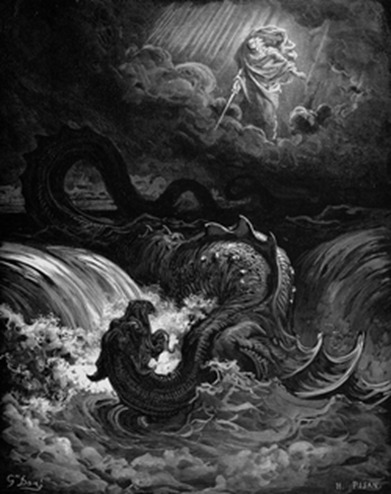
In mythology and theology the Leviathan is a sea-serpent and is mentioned in several books of the Hebrew Bible such as the Book of Job and Book Isaiah and Book of Enoch. The Leviathan of the Book of Job is a reflection of the older Canaanite Lotan, a primeval monster defeated by the god Baal Hadad. Parallels to the role of Mesopotamian Tiamat defeated by Marduk have long been drawn in comparative mythology, as have been wider comparisons to dragon and world serpent narratives such as Indra slaying Vrtra or Thor slaying Jörmungandr.
Once again we see the pattern of Biblical creatures being “inspired” from pagan ones.
Thomas Aquinas described Leviathan as the demon of envy, first in punishing the corresponding sinners. Peter Binsfeld likewise classified Leviathan as the demon of envy, as one of the seven Princes of Hell corresponding to the seven deadly sins. Leviathan became associated with, and may originally have been referred to by, the visual motif of the Hellmouth, a monstrous animal into whose mouth the damned disappear at the Last Judgment, found in Anglo-Saxon art from about 800, and later all over Europe.
In the Book of Enoch, The Leviathan is a female giant chaos serpent that lives deep in the ocean, while her mate, Behemoth, is a male giant chaos beast (based off of a hippopotamus or water-ox) who lives in the mythical desert of Duidain, East of Eden.
Ring any bells. Chaos mongering (fomenting), ox, eastern gate of eden….

The Hebrew word that translates to Leviathan (Livyatan) appears six times in the Old Testament. One of them is in Job 41. The word is derived from the root Iwy or ‘ twist, coil’ and means ‘the sinuous one.’ So I think we can establish that this creature is at least indicated to be snake-like. Scholars trace the etymology of whale and crocodile
In the Book of Isaiah it is mentioned that the beast will rise from the water and will be defeated by God on the Last Day. However, quite interestingly nowhere in the Old Testament is the Leviathan written as evil. Only later scholars have equated it with the devil so that the battle between God and Chaos can be interpreted as the battle between God and the Devil.
Now let’s make this more interesting: The Gnostic sect venerate the biblical serpent of the Garden of Eden as a symbol of wisdom, which the malevolent Demiurge tried to hide from Adam and Eve. They identify the Leviathan as the serpent of Eden and in this belief system the Leviathan appears as an Ouroboros, separating the divine realm from humanity by enveloping or permeating the material world.
I mean I don’t even need to say anything further.

And he does show up in GO Season 2. The matchbox.
Here

When did this happen, I wonder……hmmmmmm
Oh YES!
Crowley wearing Aziraphale’s face
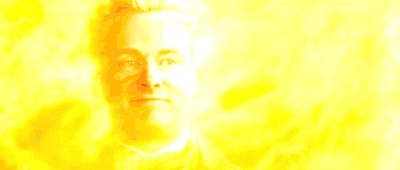
Here’s the rest of the passage from Job
1 Canst thou draw out leviathan with an hook? or his tongue with a cord which thou lettest down?
2 Canst thou put an hook into his nose? or bore his jaw through with a thorn?
3 Will he make many supplications unto thee? will he speak soft words unto thee?
4 Will he make a covenant with thee? wilt thou take him for a servant for ever?
5 Wilt thou play with him as with a bird? or wilt thou bind him for thy maidens?
6 Shall the companions make a banquet of him? shall they part him among the merchants?
7 Canst thou fill his skin with barbed irons? or his head with fish spears?
8 Lay thine hand upon him, remember the battle, do no more.
9 Behold, the hope of him is in vain: shall not one be cast down even at the sight of him?
10 None is so fierce that dare stir him up: who then is able to stand before me?
11 Who hath prevented me, that I should repay him? whatsoever is under the whole heaven is mine.
12 I will not conceal his parts, nor his power, nor his comely proportion.
13 Who can discover the face of his garment? (penetrate his coat of armor) or who can come to him with his double bridle?
14 Who can open the doors of his face? his teeth are terrible round about.
15 His scales are his pride, shut up together as with a close seal.
16 One is so near to another, that no air can come between them.
17 They are joined one to another, they stick together, that they cannot be sundered.
18 By his neesings a light doth shine, and his eyes are like the eyelids of the morning.
19 Out of his mouth go burning lamps, and sparks of fire leap out.
20 Out of his nostrils goeth smoke, as out of a seething pot or caldron.
21 His breath kindleth coals, and a flame goeth out of his mouth.
22 In his neck remaineth strength, and sorrow is turned into joy before him.
23 The flakes of his flesh are joined together: they are firm in themselves; they cannot be moved.
24 His heart is as firm as a stone; yea, as hard as a piece of the nether millstone.
25 When he raiseth up himself, the mighty are afraid: by reason of breakings they purify themselves.
26 The sword of him that layeth at him cannot hold: the spear, the dart, nor the habergeon.
27 He esteemeth iron as straw, and brass as rotten wood.
28 The arrow cannot make him flee: slingstones are turned with him into stubble.
29 Darts are counted as stubble: he laugheth at the shaking of a spear.
30 Sharp stones are under him: he spreadeth sharp pointed things upon the mire.
31 He maketh the deep to boil like a pot: he maketh the sea like a pot of ointment.
32 He maketh a path to shine after him; one would think the deep to be hoary.
33 Upon earth there is not his like, who is made without fear.
34 He beholdeth all high things: he is a king over all the children of pride.
The Leviathan is a magnificent creature. And the very fact that God goes to so much trouble to describe the magnanimity of this creature is to show what God has created and hence Her magnanimity must be even greater in comparison for the Creator is always superior to the Creation. And if God can so easily abuse and humiliate this beautiful monster, then God must be worshipped and feared.
Though to the unsuspecting eye these passages may ring no familiar bells, a closer look makes you realize how Crowley-coded they are. And to think that in a story where Neil has never witten or shown anything that wasn’t woven in finely with the characters, I alwsy wondered why he chose the Book of Job for the minisode when he could have included any other one.
But it reminded me that Crowleys character is truly unrelenting. He’s a nether millstone. He won’t give up that easily. He absolutely won’t submit to anyone, and he’s shown time and time again that his vociferous litanies about running away disappear as soon as someone or something he cares about is in danger (i.e. Aziraphale). And the second coming will also threaten his creation (the universe). His refusal to submit to authority, the refusal to be subjugated is the reason he fell in the first place. And quite interestingly he doesn’t own Hell either. He resists that too. For him it’s not Heaven or Hell that matters but the resistance to Power.
I also think it’s also fitting that the Leviathan is perceived to be a monster that must be slain or enslaved but in reality is another of God’s creations just like the sun and the stars and the rivers and the mountains.
And it makes me think of how Crowley has always been labeled as evil because he fell. I think of how, at heart, he is truly gentle and kind, he’s a starmaker. But his fall, his appearance, his desire to be autonomous and his grey moral campus make him feared and a target. And that has made him the embodiment of chaos. His refusal to submit himself to the uniformity of both worlds, to the rules and guidelines that create this illusion of order sets him apart from them. He embraces the chaos that grayness offers, that being ‘human’ brings. And hence the final battle will be between God and chaos with God justifies as being the battle between good and evil because, well, he’s a demon.
The Leviathan being historically associated with the sin of envy is again I think written into the plot very carefully. He is envious of humanity’s ability to question God, to have choices to not be doomed to heaven or hell for all eternity. He is envious of what Maggie and Nina have. He’s envious of what Beelz and Gabe have.
“I mean if Gabriel and Beelzebub can go off together…..”
And then him rejecting Azirapahle’s offer— he has spent his life (a long, long life) rejecting power and authority. In his relationship with Aziraphale he found his sanctuary, a relation clean of power dynamics. Up till now they were both equal. But this new offer jeopardizes that.
And I love how his ego and pride come to play here. He would never accept being “second in command to anyone”. And his envy of how God’s mercy is free for some but wholly denied to him.
#good omens season 2#good omens#crowley#aziraphale#azicrow#aziraphale x crowley#neil gaiman#ineffable husbands#good omens meta#good omens brainrot#good omens book#beelzebub#gabriel#good omens broke me#christianity#history#relegious iconology#leviathan#demons#angels#go s2#go season 2#give me season 3 or give me death#bible fanfiction#meena rants
46 notes
·
View notes